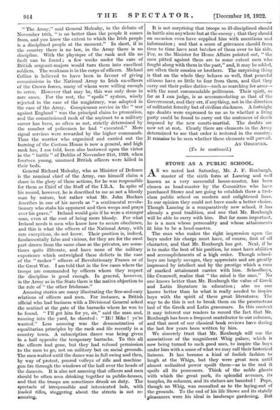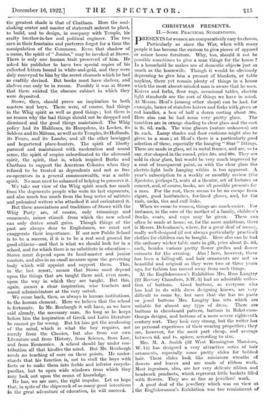STOWE AS A PUBLIC SCHOOL.
AS we noted last Saturday, Mr. J. F. Roxburgh, master of the sixth form at Lancing and well known as a very successful house-master, has been chosen as head-master by the Committee who have purchased Stowe and are going to establish there a first- class public school on modern and enlightened lines. In our opinion they could not have made a better choice. Though Lancing is a comparatively new school, it has already a good tradition, and one that Mr. Roxburgh will be able to carry with him. But far more important, he is a man whose personality and whose attainments fit him to be a head-master.
The man who makes the right impression upon the boys under his charge must have, of course, first of all character, and that Mr. Roxburgh has got. Next, if he is to make the best of his position, he must have abilities and accomplishments of a high order. Though school- boys are largely savages, they appreciate and are greatly impressed by intellect and by the prestige which a man of marked attainment carries with him. Schoolboys, like Cromwell, realize that "the mind is the man." No one knows better than Mr. Roxburgh the value of Greek and Latin literature in education ; also no one knows better than he what is really needed to inspire boys with the spirit of these great literatures. The way to do this is not to break them on the procrustean bed of the Greek and Latin grammars. In this context it may interest our readers to record the fact that Mr. Roxburgh has been a frequent contributor to our columns, and that most of our classical book reviews have during the last few years been written by him.
We sincerely trust that Mr. Roxburgh will use the associations of the magnificent Whig palace, which is now being turned to such good uses, to inspire the boys under him with a sense of what we may call their historical liaisons. It has become a kind of foolish fashion to laugh at the Whigs, but they were great men until almost unlimited power spoilt them—as in the end it spoils all its possessors. Think of the noble ghosts with which the great park, its splendid avenues, its temples, its columns, and its statues are haunted Pope, though no Whig, was consulted as to the laying-out of the grounds. To the end of his life Stowe and its stately pleasances were his ideal in landscape gardening. But the greatest shade is that of Chatham. Here the soul- shaking orator and master of statecraft unbent to plant, to build, and to design, in company with Temple, his crafty brother-in-law and political engineer. The two men in their fountains and parterres forgot for a time the manipulation of the Commons. Even that shadow of a name, the spirit of" Junius," may be invoked at Stowe.
There is only one human trait preserved of him- He asked his publisher to have two special copies of his collected letters bound in white-and-gold, and they were duly conveyed to him by the secret channels which he had so craftily devised. But books must have shelves, and shelves can only be in rooms. Possibly it was at Stowe that there existed the obscure cabinet in which they were deposited.
Stowe, then, should prove an inspiration to both masters and boys. There were, of course, bad things in the Whig spirit as well as good things ; but there is no reason why the bad things should not be dropped and dismissed and the good things maintained. The Whig policy had its Halifaxes, its Hampdens, its Lockes, its Seldens and its Miltons, as well as its Temples, its Hollands, its Foxes, and its Lambs, and all the other bewigged and begartered place-hunters. The spirit of liberty pursued and maintained with moderation and sound sense, the spirit of empire subordinated to the aforesaid spirit, the spirit, that is, which inspired Burke and Chatham to support the American Colonies when they refused to be treated as dependents and not as free co-operators in a general commonwealth, was a noble spirit. No man need be ashamed of helping to preserve it.
We take our view of the Whig spirit much too much from the degenerate people who were its last exponents, and also much too much from the long series of satirists and polemical writers who attacked it and caricatured it.
But these associations and traditions of Stowe with the Whig Party are, of course, only trimmings and ornaments, minor stimuli from which the new school can only derive small gains. Though things of the past are always dear to Englishmen, we must not exaggerate their importance. If our new Public School is to be a success, if it is to be a real seed ground for good citizens—and that is what we should look for in a school, and for which there is no substitute in education— Stowe must depend upon its head-master and junior masters, and also in no small measure upon the governing body which will appoint and support them. This, in the last resort, means that Stowe must depend upon the things that axe taught there and, even more, upon the way in whizh they are taught. But this, again, means a clear inspiration, wise teachers and sound administrators at the very outset.
We come back, then, as always in human institutions, to the human element. Here we believe that the school is fortunate. In Mr. Roxburgh it will have, as we have said already, the necessary man. So long as he keeps before him the inspiration of Greek and Latin literature he cannot go far wrong. But let him get the awakening of the mind, which is what the boy requires, not merely from the Classics, but also from our own Literature and from History, from Science, from Law, and from Economics. A school should lay under con- tribution all that kindles the mind. But Mr. Roxburgh needs no teaching of ours on these points. He under- stands that his function is, not to stuff the boys with facts or to make thera into feeble and inferior encyclo- paedias, but to open wide windows from which they may look out upon the ocean of knowledge. He has, we are sure, the right impulse. Let us hope that, in spite of the shipwreck of so many good intentions In the great adventure of education, he will succeed.















































 Previous page
Previous page